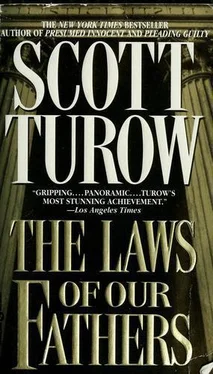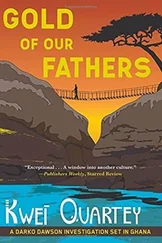Scott Turow - The Laws of our Fathers
Здесь есть возможность читать онлайн «Scott Turow - The Laws of our Fathers» весь текст электронной книги совершенно бесплатно (целиком полную версию без сокращений). В некоторых случаях можно слушать аудио, скачать через торрент в формате fb2 и присутствует краткое содержание. Жанр: Криминальный детектив, на английском языке. Описание произведения, (предисловие) а так же отзывы посетителей доступны на портале библиотеки ЛибКат.
- Название:The Laws of our Fathers
- Автор:
- Жанр:
- Год:неизвестен
- ISBN:нет данных
- Рейтинг книги:5 / 5. Голосов: 1
-
Избранное:Добавить в избранное
- Отзывы:
-
Ваша оценка:
- 100
- 1
- 2
- 3
- 4
- 5
The Laws of our Fathers: краткое содержание, описание и аннотация
Предлагаем к чтению аннотацию, описание, краткое содержание или предисловие (зависит от того, что написал сам автор книги «The Laws of our Fathers»). Если вы не нашли необходимую информацию о книге — напишите в комментариях, мы постараемся отыскать её.
The Laws of our Fathers — читать онлайн бесплатно полную книгу (весь текст) целиком
Ниже представлен текст книги, разбитый по страницам. Система сохранения места последней прочитанной страницы, позволяет с удобством читать онлайн бесплатно книгу «The Laws of our Fathers», без необходимости каждый раз заново искать на чём Вы остановились. Поставьте закладку, и сможете в любой момент перейти на страницу, на которой закончили чтение.
Интервал:
Закладка:
In my household, there was never really a holiday season, at any point in the year. In Vienna, my father had been raised as a freethinker. He identified himself as a Jew and was ever on alert for anti-Semitism, which he found pervasive, but even after his wartime experiences – perhaps because of them – he disdained all form of religious practice. That was not true of my mother. Having lost everyone who mattered in the camps, having seen everything precious destroyed, she clung fervently to the customs, albeit in a fairly unobtrusive way, since she preferred no disputes with my father. She bought kosher meats, did not mix meat and dairy, and lit candles on Friday nights. On holidays, she celebrated in muted fashion – a polite Pesach Seder and a Yom Kippur fast. My father went to work. For her sake, I was given a religious education at Temple Beth Shalom, where professors from the U. sent their kids.
At Hanukkah, we lit the menorah, and my father and she gave gelt – not the foil-wrapped chocolate coins but real money. In my father's eyes this was a gift with meaning. The closest we came to any other form of seasonal celebration was driving down the snowy streets on Christmas Eve to admire the lighted decorations of our gentile neighbors. My father, of course, approved of any form of entertainment which did not require spending money, and the lights always thrilled me: the brightness, the festivity, the whole season of free-spending and openhanded generosity.
At any rate, the year before I turned sixteen, I took the $10 bill my father had given me for Hanukkah and on impulse bought a four-foot aluminum Christmas tree. I made the purchase at a local five-and-dime and had the tree set up on its green wood base before either of my parents saw it. In shock, my mother stood before the tree, which was mounted on a small end table in my bedroom, a bit like an altar, and remonstrated with me in each of the four languages she spoke.
Consciously, I had persuaded myself that because he was not observant, my father would not mind the tree. Of course, he was in my room within instants of arriving home. He was a person of medium size – my height comes from my mother's people, and I think that neither of us could get used to the fact that I was already two or three inches taller than he was. He was one of those bald-headed men who lets the hair on one side grow long and pastes it across his scalp. He wore metal-framed glasses and a heavy woolen suit, three pieces. He rocked on his toes.
‘I see,' my father said, in his heavy accent. With his talent for the most prosaic, he added, 'This is how you spend the money we give to you?'
'I thought it was a gift.' I was lying on my bed reading. 'A gift means a person buys what he likes.'
'No,' said my father staring up at the Christmas tree. He shook his head ponderously. 'No gifts for this.'
The next day when I returned from school, the Christmas tree was gone. Neither of them ever offered an explanation. And my father never willingly gave me another dollar. The idea, I suppose, was that I was first required to make some amends. But that I refused to do. I know, in retrospect, how they saw what I'd done. Not simply a rejection. But an act of emotional vandalism. I ignored their pain, no doubt. But I took no pleasure in it. My concern was myself. I wanted to break out of the lightlessness, the dead air, the suffering and silence of my parents' home. I wanted to stake my claim to a life where every moment is not shrouded by the memory of the most terrible deeds and to ask them, I suppose, to recognize that desire in me, to give me their blessing to be different from them in that fundamental respect. But this was not a destiny either of them had ever envisioned for me, and such permission, as it turned out, was never to be granted. After that, I had board and shelter in my parents' home. Otherwise, I provided for myself. I had a collection of odd jobs after school and over the summers: hardware-store clerk, busboy, fry cook. My mother was always tucking $20 in my pocket when my father was not around, but she did not dare confront him. In college, I financed my tuition with a federally subsidized loan. To embarrass my father, I went to his bank, where they knew how wealthy he was, and when I'd saved enough money for a car, I bought a Volkswagen, the Hitler-mobile, knowing it would drive him wild. But in time, I realized that given impossible choices, I had lost anyway. I had indulged my father in his fundamental selfishness. And I never removed the restraint of their expectations. My mother never lifted her prayerful gaze from me, never stopped fussing over me or begging me in a million silent ways to redeem her life. I was never free. And the weight of all of that fell over me again now in the wake of my father's call.
As Sonny watched, I replaced the phone. I sat first, then lay down fully on the rug. My hands were over my face.
'Oh, kidnap me,' I cried, 'kidnap me, kidnap me. Somebody kidnap me.'
When I opened my eyes, Eddgar was across the living room on the threshold of the open front door. Ironically, he held money – a few bills – rolled in his hand. He had come down to pay me for the week. Unspeaking, he watched me lying there in agony, his perfect, mad eyes unblinking, intent.
'What did you mean?' Eddgar asked me the next night. 'Kidnap you?' June and he had just returned from another long evening with their lawyers. A number of attorneys from the ACLU and Damon Law School had come forward to mount Eddgar's defense, joining the old standbys, renowned lefties, who'd been defending the Panthers for years. I had the sense there were sharp divisions in the legal team over tactics, about whether the forthcoming hearing should be conducted to make a political statement or to save Eddgar's job. Arriving home, the Eddgars often appeared wrung out and at odds with each other. Scrutinizing me now, Eddgar already looked exhausted, so dark beneath the eyes he might have been bruised.
I'd often explained my differences with my parents to June and I was in no mood to go over the subject now. But Eddgar's look lingered. I sensed, as I often had, the special reprieve for Eddgar in moving about in someone else's life.
'So if someone wanted to kidnap you, you'd go?' he asked.
'I don't think they'd believe it.'
'I would think not,' June said. She was drinking bourbon and smoking. Sitting at the sofa's edge, she flicked ashes from the end of the cigarette more often than necessary, flipping her thumbnail against the filter. For whatever reason – practicing perhaps for the demeanor she'd affect in the hearing room – she'd taken on more of a subdued, girlish appearance, a bit of the homespun country gal. Her hair was pulled back and secured with bright rings of yarn. She wore a little sundress, and the length of her smooth legs, without hose, glowed as she sat there. Leaning toward the ashtray, she jerked a bit on her hem, in response to my inspection. 'They'd certainly have suspicions,' she said.
Eddgar held his jaw. A sign might as well have lit up on his chest, reading, I am scheming.
'What if there was ransom?' he asked. 'Can your father afford it?'
'Afford it? Sure. He could probably afford a lot. But knowing my father, he wouldn't pay it.'
June laughed. 'Seth, you remind me of Eddgar when you carry on about your father.' Eddgar's father was a physician by training, but he made his living as a tobacco planter. If you could credit their descriptions, he was a man of ruthless temper, rigid, unforgiving, a hard-shell Christian more excited by the damnation of the wicked than the eternal grace of the saved. June and Eddgar both referred to him in an act of academic derision as 'The Mind of the South.'
For the moment, Eddgar ignored June, struck by my prediction that my father would refuse any ransom request. He threw up his hands.
Читать дальшеИнтервал:
Закладка:
Похожие книги на «The Laws of our Fathers»
Представляем Вашему вниманию похожие книги на «The Laws of our Fathers» списком для выбора. Мы отобрали схожую по названию и смыслу литературу в надежде предоставить читателям больше вариантов отыскать новые, интересные, ещё непрочитанные произведения.
Обсуждение, отзывы о книге «The Laws of our Fathers» и просто собственные мнения читателей. Оставьте ваши комментарии, напишите, что Вы думаете о произведении, его смысле или главных героях. Укажите что конкретно понравилось, а что нет, и почему Вы так считаете.












